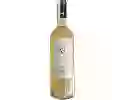
Domaine Theulet Marsalet - Domaine René MonbouchéDomaine Haut Marsalet Vieilles Vignes Monbazillac
This wine generally goes well with
Details and technical informations about Domaine Theulet Marsalet - Domaine René Monbouché's Domaine Haut Marsalet Vieilles Vignes Monbazillac.
Discover the grape variety: Verdejo
An ancient grape variety that has been cultivated for a long time, mainly in the Rueda region of northwestern Spain. D.N.A. tests show that it is the result of a natural cross between Savagnin and Castellana Blanco. It should not be confused with the Verdelho, which is very well known in Portugal, and the Verdelho Branco, which is almost more widespread. The Verdejo is registered in the Official Catalogue of wine grape varieties list A. It can also be found in the United States (Virginia, California, etc.), Australia, Portugal, etc., but is practically unknown in France.
Last vintages of this wine
The best vintages of Domaine Haut Marsalet Vieilles Vignes Monbazillac from Domaine Theulet Marsalet - Domaine René Monbouché are 2013, 2011
Informations about the Domaine Theulet Marsalet - Domaine René Monbouché
The Domaine Theulet Marsalet - Domaine René Monbouché is one of of the world's greatest estates. It offers 8 wines for sale in the of Monbazillac to come and discover on site or to buy online.
The wine region of Monbazillac
The wine region of Monbazillac is located in the region of Guyenne of South West of France. Wineries and vineyards like the Domaine Tirecul la Gravière or the Grande Maison produce mainly wines sweet, white and red. The most planted grape varieties in the region of Monbazillac are Muscadelle, Pinot noir and Malbec, they are then used in wines in blends or as a single variety. On the nose of Monbazillac often reveals types of flavors of honey, elderflower or cream and sometimes also flavors of tropical, pear or white peach.
The wine region of South West
The South-West is a large territorial area of France, comprising the administrative regions of Aquitaine, Limousin and Midi-Pyrénées. However, as far as the French wine area is concerned, the South-West region is a little less clear-cut, as it excludes Bordeaux - a wine region so productive that it is de facto an area in its own right. The wines of the South West have a Long and eventful history. The local rivers play a key role, as they were the main trade routes to bring wines from traditional regions such as Cahors, Bergerac, Buzet and Gaillac to their markets.
The word of the wine: Grand Cru
In Burgundy, the fourth and final level of classification (above the regional, communal and premier cru appellations), designating the wines produced on delimited plots of land (the climats) whose name alone constitutes the appellation. The climats classified as Grand Cru are 32 in the Côte d'Or plus one in Chablis which is divided into 7 distinct climats. Representing barely 1.5% of the production, the Grand Crus are the aristocracy of Burgundy wines.














